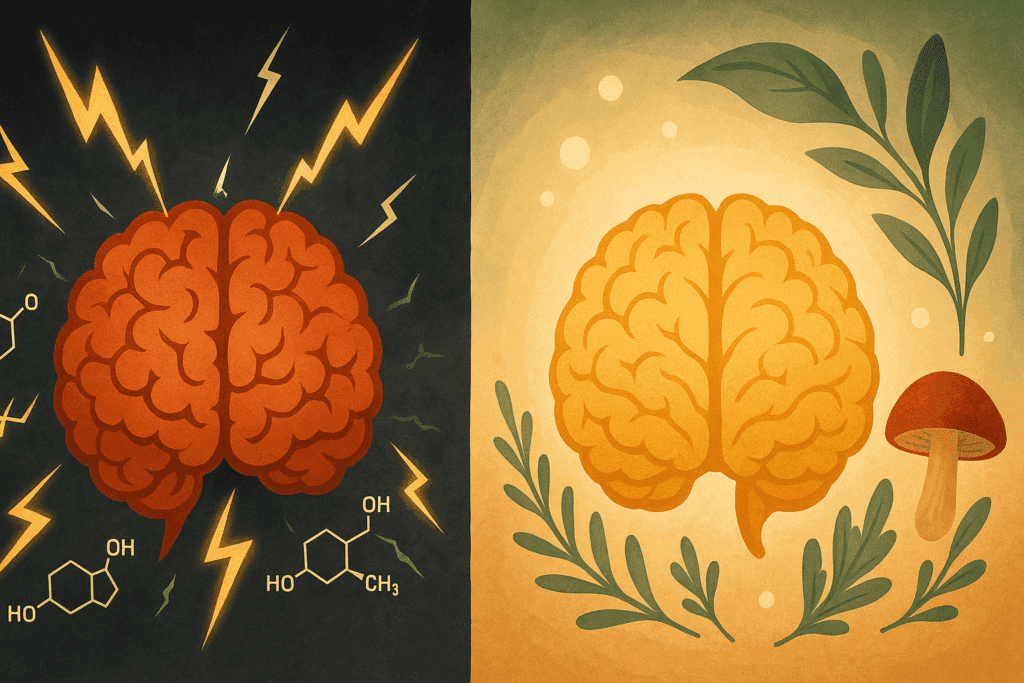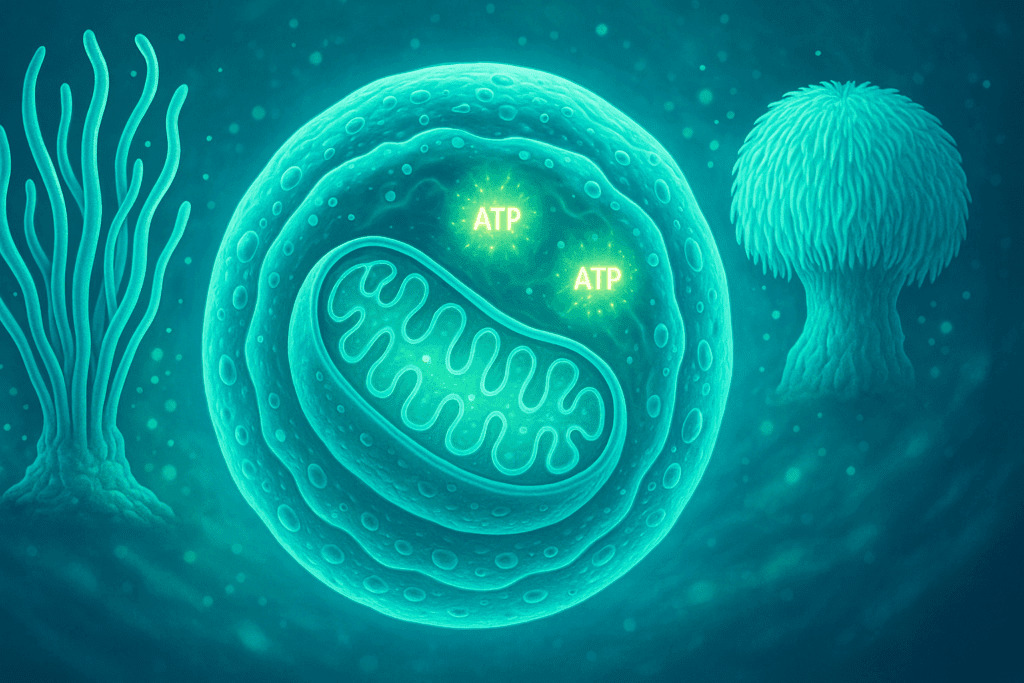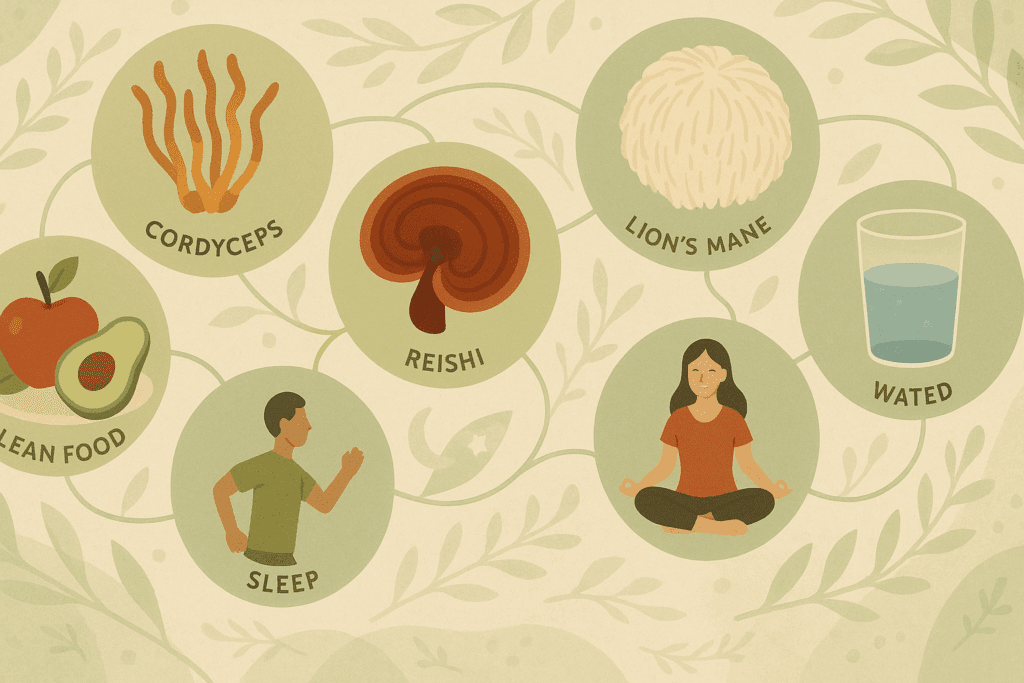In a world that constantly demands more from us—more focus, more productivity, more resilience—the need to find sustainable and natural ways to keep up is stronger than ever. While synthetic stimulants and over-caffeinated energy drinks may offer a short-lived jolt, they often leave the body in a worse state than before. Enter adaptogenic mushrooms, a fascinating class of natural substances that offer a unique synergy of mental calm and physical vigor. These remarkable fungi provide a holistic approach to wellness, making them a compelling option for anyone looking to calm the mind while simultaneously experiencing lots of energy in their daily lives.
Adaptogens work by supporting the body’s ability to adapt to stressors—whether physical, emotional, or environmental—and mushrooms are among the most potent sources of these bioactive compounds. Used in traditional medicine systems for centuries and increasingly validated by modern scientific research, adaptogenic mushrooms have proven to be a reliable and sustainable energy-enhancing option. This comprehensive guide will take you deep into the realm of these medicinal marvels, exploring their mechanisms of action, their wide-ranging benefits, and how to integrate them effectively into a wellness routine.
You may also like: Unlock Powerful Stress-Relief with Adaptogenic Mushrooms and Stamina Herbal Support

Understanding Adaptogens: Nature’s Response to Stress
To truly appreciate the role of adaptogenic mushrooms, it is essential first to understand what adaptogens are and how they function in the body. Adaptogens are a select group of herbs and fungi known for their ability to help the body resist and recover from stress. Unlike stimulants that artificially raise energy levels, adaptogens work by normalizing bodily functions, helping to bring the body into a state of balance or homeostasis.
Adaptogens modulate the production and release of hormones, particularly those related to the stress response, such as cortisol. They interact with the hypothalamic-pituitary-adrenal (HPA) axis, which governs the body’s reaction to stress. By stabilizing the stress response, adaptogens can reduce fatigue, improve focus, and enhance overall vitality. In doing so, they contribute to a sustained feeling of wellness and alertness that is far more stable and enduring than the fleeting effects of stimulants.
One of the most compelling aspects of adaptogens is their bidirectional action. They do not overstimulate or suppress but rather adjust according to the body’s needs. For instance, if the body is fatigued, adaptogens can help increase energy production. If the body is overstimulated, they can help induce calm. This balancing effect is precisely why adaptogenic mushrooms are invaluable allies for individuals seeking both serenity and lots of energy without the drawbacks of artificial enhancers.

Key Adaptogenic Mushrooms That Promote Lots of Energy
The world of adaptogenic mushrooms is rich and varied, with each species offering its unique profile of benefits. However, a few key varieties have emerged as the most potent when it comes to enhancing energy while reducing stress.
Cordyceps is perhaps the most well-known mushroom for energy enhancement. Traditionally used in Tibetan medicine and now widely studied, Cordyceps increases the body’s production of adenosine triphosphate (ATP), the molecule that delivers energy to cells. This results in improved endurance, reduced fatigue, and enhanced oxygen utilization. For athletes and busy professionals alike, Cordyceps offers a reliable way to feel lots of energy throughout the day.
Reishi, often referred to as the “mushroom of immortality,” is another powerhouse, though its effects are more calming than stimulating. Rich in triterpenoids and polysaccharides, Reishi modulates immune function and reduces inflammation, which can contribute to overall vitality. By supporting restful sleep and reducing anxiety, Reishi creates the internal conditions needed for sustained energy and emotional stability.
Lion’s Mane stands out for its cognitive benefits. It stimulates the production of nerve growth factor (NGF), a protein essential for the growth and maintenance of neurons. Enhanced cognitive function often translates into improved mental energy, making Lion’s Mane a valuable ally for those who want to stay mentally sharp and feel lots of energy in thought and action.

How Adaptogenic Mushrooms Address the Question: Why Do I Have So Much Energy?
One of the more intriguing questions that may arise when using adaptogenic mushrooms is, “Why do I have so much energy?” This unexpected vitality often comes as a surprise to those who have previously relied on caffeine or sugar to get through the day. The answer lies in the unique, synergistic way adaptogens support physiological balance.
When the body is no longer in a constant state of stress, it can redirect its resources toward productivity, healing, and performance. Adaptogenic mushrooms reduce the metabolic drag caused by chronic stress, freeing up energy that was previously consumed by anxiety and inflammation. As a result, users often find themselves experiencing bursts of physical and mental energy that feel entirely natural.
Moreover, adaptogens improve mitochondrial efficiency and cellular respiration, both of which are foundational to sustained energy production. Rather than offering a temporary fix, they help to build a more resilient internal ecosystem, one that can sustain high energy levels without the crash. This is why individuals who regularly consume adaptogenic mushrooms may find themselves wondering, sometimes with amazement, why they suddenly have so much energy.

The Science Behind Adaptogenic Mushrooms and Energy Metabolism
Modern science is beginning to catch up with what traditional medicine has long understood: adaptogenic mushrooms offer measurable, physiological benefits that translate into real-world outcomes. Numerous studies have demonstrated how mushrooms like Cordyceps and Lion’s Mane enhance energy metabolism at the cellular level.
Cordyceps, for instance, has been shown to increase the production of ATP, the energy currency of the cell. It does this by boosting the efficiency of the mitochondria, the powerhouses within our cells. Enhanced mitochondrial function means that the body can produce more energy using the same amount of nutrients, leading to improved endurance and reduced fatigue.
Lion’s Mane contributes to neurological energy by fostering neurogenesis and synaptic plasticity. When the brain can form new connections more efficiently, mental energy and focus improve. This translates into better decision-making, quicker thinking, and a generally more vibrant cognitive state. Combined with the calming effects of Reishi, which helps regulate the autonomic nervous system, the overall impact is a grounded, sustained feeling of energy and clarity.
Reishi also has adaptogenic properties that influence hormonal balance, particularly concerning cortisol. High cortisol levels can drain energy reserves, disrupt sleep, and impair immune function. By normalizing cortisol levels, Reishi helps to eliminate these energy drains, allowing the body to redirect resources toward vitality and wellness.
Practical Ways to Incorporate Adaptogenic Mushrooms for Lots of Energy
Integrating adaptogenic mushrooms into your daily routine can be both enjoyable and effective. The key is consistency and finding the right format that works with your lifestyle. Mushrooms can be consumed in various forms, including capsules, powders, tinctures, and teas. Each method has its advantages, and the choice largely depends on personal preference.
Powdered mushrooms are particularly versatile and can be easily added to smoothies, coffee, or even baked goods. This form is often preferred by those who enjoy experimenting with different recipes and dosages. Tinctures offer a more concentrated dose and are absorbed quickly into the bloodstream, making them ideal for individuals looking for immediate effects.
For those new to adaptogenic mushrooms, starting with a blended formula that includes Cordyceps, Reishi, and Lion’s Mane can provide a broad-spectrum benefit. Over time, users may choose to focus on specific mushrooms that align best with their needs. For instance, someone dealing with chronic fatigue may prioritize Cordyceps, while a person struggling with anxiety might find Reishi more beneficial.
Timing is also crucial. Cordyceps is best taken in the morning or before a workout to capitalize on its energizing properties. Reishi, due to its calming effects, is more suitable for evening use. Lion’s Mane can be consumed at any time of the day but is particularly effective in the morning to support mental clarity throughout the day.
Lots of Energy Without the Crash: The Advantage Over Stimulants
One of the most compelling benefits of adaptogenic mushrooms is that they provide lots of energy without the notorious crash associated with stimulants like caffeine and sugar. Traditional energy enhancers often act by triggering a temporary release of adrenaline and dopamine, which feels invigorating initially but leads to a rebound effect that leaves the body even more depleted.
Adaptogenic mushrooms, on the other hand, work with the body rather than against it. They promote energy by enhancing metabolic efficiency, reducing inflammation, and improving hormonal balance. This results in a stable, sustainable form of energy that supports both physical activity and mental performance over extended periods.
This is especially important for individuals dealing with stress-related fatigue, burnout, or adrenal exhaustion. In such cases, stimulants can exacerbate the underlying problem by overtaxing the adrenal glands. Adaptogens provide a gentler, more sustainable solution that supports long-term healing and resilience. As a result, users not only feel energized but also more emotionally balanced and mentally focused.

Combining Mushrooms With Lifestyle Strategies for Maximum Vitality
While adaptogenic mushrooms are powerful in their own right, their benefits can be significantly amplified when combined with other healthy lifestyle strategies. Nutrition, sleep hygiene, stress management, and physical activity all play a critical role in determining how effectively the body produces and maintains energy.
A nutrient-dense diet rich in whole foods, healthy fats, and lean proteins provides the raw materials needed for cellular energy production. Hydration is equally important, as even mild dehydration can lead to fatigue and decreased cognitive function. Incorporating adaptogenic mushrooms into a well-rounded diet ensures that the body has both the tools and the support it needs to thrive.
Regular exercise also enhances the benefits of adaptogens by improving circulation, increasing mitochondrial density, and reducing stress. Even moderate physical activity like walking or yoga can significantly boost the body’s responsiveness to adaptogens. Additionally, practices such as mindfulness meditation and deep breathing exercises help to stabilize the nervous system, making it easier for adaptogens to work effectively.
Sleep, often overlooked, is perhaps the most critical pillar of sustainable energy. Adaptogenic mushrooms like Reishi support restorative sleep by calming the nervous system and reducing cortisol levels. A consistent sleep schedule combined with the right adaptogens can dramatically improve both daytime energy and nighttime recovery.
Recognizing When You Feel Lots of Energy: What It Says About Your Health
When people begin incorporating adaptogenic mushrooms into their wellness routine, they may start asking themselves, “Why do I have so much energy all of a sudden?” This shift is not just a pleasant surprise—it’s a meaningful indicator of improved health. Experiencing an increase in energy can signify that several internal systems are functioning more efficiently.
Improved mitochondrial function, better hormonal balance, and enhanced neurotransmitter activity all contribute to elevated energy levels. These physiological improvements often manifest as better mood, clearer thinking, and greater physical endurance. When the body no longer has to constantly battle inflammation or stress, it can focus its resources on thriving rather than merely surviving.
This newfound energy is not superficial; it is a reflection of deeper systemic healing. It suggests that the body is reaching a new level of homeostasis, where energy production and consumption are in optimal balance. As a result, individuals often report not only more energy but also a stronger sense of purpose, creativity, and emotional resilience.
The Broader Implications of Natural Energy Enhancement
The benefits of having lots of energy extend far beyond personal productivity. When individuals feel vibrant and resilient, they are more likely to engage in meaningful relationships, pursue personal goals, and contribute positively to their communities. Energy is the fuel for creativity, connection, and transformation.
From a societal perspective, the growing interest in adaptogenic mushrooms represents a shift toward more sustainable and holistic approaches to health. Rather than masking symptoms or chasing quick fixes, people are increasingly seeking interventions that support the body’s innate capacity for healing and balance. This trend is aligned with the principles of integrative medicine, which emphasizes the importance of treating the whole person.
Moreover, the use of adaptogenic mushrooms has important environmental implications. Many of these fungi can be cultivated sustainably and do not require the intensive resource input associated with pharmaceutical production. As awareness grows, adaptogens may become a cornerstone of a more conscious and ecologically responsible approach to wellness.
Frequently Asked Questions: Unlocking the Power of Adaptogenic Mushrooms for Lots of Energy
How quickly can I expect to feel the effects of adaptogenic mushrooms?
The onset of noticeable benefits from adaptogenic mushrooms varies widely based on the individual’s metabolic rate, baseline stress levels, and overall lifestyle. Some people report subtle improvements in mental clarity and stamina within a few days, especially when using highly bioavailable forms like dual-extracted tinctures. However, for most users, the more transformative benefits—including enhanced resilience to stress, deeper sleep, and lots of energy—become evident after consistent use over several weeks. These mushrooms work cumulatively by helping the body achieve internal balance, so long-term adherence often yields the best outcomes. Rather than functioning like fast-acting stimulants, they offer a deeper recalibration that supports more sustainable, systemic energy regulation.
Is it safe to combine different adaptogenic mushrooms in one regimen?
Yes, combining multiple adaptogenic mushrooms is not only safe for most individuals but may actually enhance therapeutic outcomes due to their complementary effects. For example, stacking Cordyceps for physical endurance with Lion’s Mane for cognitive function and Reishi for emotional balance can provide a more well-rounded approach to achieving lots of energy without sacrificing calm or mental clarity. It’s advisable to introduce one mushroom at a time when starting, then gradually layer others in to observe how your body responds to each. Practitioners of integrative health often advocate for personalized mushroom blends tailored to specific health objectives and constitutional types. Consulting with a naturopath or functional medicine provider can offer further guidance, especially if you’re taking medications or managing chronic conditions.
Why do I have so much energy when I cut back on coffee and start using mushrooms?
This is a common and fascinating experience reported by new users of adaptogenic mushrooms. The paradox of feeling lots of energy after reducing caffeine often stems from the elimination of stimulant-induced stress on the adrenal system. Caffeine, while energizing short-term, can lead to cycles of overstimulation and eventual burnout, especially when consumed in excess. Adaptogenic mushrooms, in contrast, nourish the body’s energy systems by supporting mitochondrial function, hormonal balance, and nervous system regulation. The result is a steady stream of natural energy that doesn’t rely on artificial boosts, which helps explain why you might find yourself asking, “Why do I have so much energy now?” even with fewer stimulants in your routine.
Can adaptogenic mushrooms support energy levels in people with chronic fatigue or autoimmune conditions?
Emerging research suggests that adaptogenic mushrooms may be beneficial for individuals with conditions like chronic fatigue syndrome (CFS) or autoimmune disorders, though individual responses vary. These mushrooms can help mitigate oxidative stress, reduce inflammatory cytokines, and support immune modulation—all factors that contribute to low energy in these populations. Cordyceps, in particular, has shown promise for enhancing ATP production in cases where mitochondrial dysfunction is a factor. While these effects won’t serve as a cure, they may complement broader treatment strategies to restore vitality. For those managing complex conditions, it’s critical to introduce adaptogens gradually and under medical supervision to avoid unintended interactions or immune overstimulation.
Lots of Energy and Mental Focus: How Do Mushrooms Influence the Brain?
The neurological effects of adaptogenic mushrooms go beyond simple stimulation. Lion’s Mane mushroom promotes the synthesis of nerve growth factor (NGF), a molecule essential for maintaining healthy neurons and supporting synaptic plasticity. Users often report enhanced memory, clearer thinking, and better emotional regulation—cognitive states that support sustained productivity and contribute to experiencing lots of energy in a mentally grounded way. Reishi also impacts neurochemistry, supporting GABA pathways that calm anxiety while improving focus. This dual action helps create a unique synergy: a calm mind paired with mental alertness, rather than hyperactivity or overstimulation. Over time, these changes can feel like a mental “reset,” leading to a new baseline of focus and enthusiasm for daily tasks.
Why do I have so much energy at night after using adaptogens in the morning?
One intriguing phenomenon with adaptogenic mushroom use is the delayed surge in energy, often peaking in the late afternoon or evening. This can occur because adaptogens don’t act like quick-release stimulants but rather modulate systems that govern circadian rhythm, metabolic energy cycles, and adrenal function. When these systems begin to reset, the timing of peak energy production can shift, especially in those with previously disrupted cortisol curves or sleep-wake cycles. For some, this newfound vitality might lead them to wonder, “Why do I have so much energy now—especially at night?” Adjusting the timing of your dosage or supporting better sleep hygiene can help redistribute energy more evenly throughout the day. For persistent issues, introducing calming adaptogens like Reishi in the evening may help restore circadian alignment.
Can I use adaptogenic mushrooms if I already feel like I have lots of energy?
Absolutely—but the intention behind using adaptogens shifts in such cases. If you already feel like you have lots of energy, adaptogenic mushrooms can help refine how that energy is used. Instead of pushing the body further into high gear, they can enhance energy efficiency, sharpen focus, and buffer against burnout. For individuals who are naturally energetic but prone to anxiety or overextension, mushrooms like Reishi and Lion’s Mane can ground that energy, channeling it into more focused, sustainable output. In this way, adaptogens function not just as energy boosters but as energy regulators, which is especially useful for high-performing professionals, athletes, or creatives seeking balance alongside stamina.
How do adaptogenic mushrooms compare to nootropics for boosting energy?
Adaptogenic mushrooms differ fundamentally from synthetic nootropics in that they don’t overstimulate the central nervous system or create dependency. While nootropics like modafinil or racetams act quickly and may deliver sharper cognitive spikes, they often come with side effects or tolerance buildup. Mushrooms like Cordyceps and Lion’s Mane offer a more gradual and integrative path to cognitive and physical enhancement, improving cellular efficiency, stress resilience, and neuroplasticity over time. Rather than trading short-term performance for long-term fatigue, adaptogens promote an internal environment conducive to lasting energy and mental clarity. For those seeking sustainable vitality rather than a quick fix, adaptogenic mushrooms offer a more holistic, body-friendly approach.
Lots of Energy but No Anxiety: How Do Mushrooms Achieve This Balance?
One of the unique benefits of adaptogenic mushrooms is their ability to deliver lots of energy without triggering the jittery, anxious side effects associated with many stimulants. This balance is achieved through their regulatory effects on the HPA axis and their modulation of neurotransmitters like GABA, dopamine, and serotonin. For instance, Cordyceps boosts physical performance by enhancing oxygen utilization and ATP synthesis, while Reishi down-regulates sympathetic nervous activity, calming the mind. The result is a state of energized calm—where you’re alert, productive, and emotionally centered. For people prone to anxiety or overstimulation, this equilibrium can be life-changing, offering a new way to experience energy that enhances rather than disrupts quality of life.
What does the future hold for adaptogenic mushrooms in energy and mental health science?
The future of adaptogenic mushroom research is incredibly promising, particularly in the fields of metabolic health, neurodegeneration, and personalized medicine. As the demand for sustainable energy solutions grows, scientists are exploring how mushrooms interact with the gut-brain axis, mitochondrial DNA, and epigenetic expression. There is also increasing interest in using mushroom-based therapies in psychiatric and neurorehabilitative settings, where the ability to deliver lots of energy while stabilizing mood could be transformative. Advances in cultivation and extraction methods are enhancing the potency and bioavailability of these compounds, opening the door to new applications in functional foods and targeted supplementation. As clinical evidence grows, we can expect adaptogens to play a more central role in integrated approaches to stress management, chronic fatigue, and cognitive optimization.
Conclusion: Harnessing the Full Power of Adaptogenic Mushrooms for Lots of Energy and Mental Clarity
The quest for sustainable, grounded vitality is not only achievable—it’s already unfolding in the lives of those who turn to nature’s most powerful adaptogens. Adaptogenic mushrooms offer a unique convergence of ancient wisdom and modern science, supporting both mental calm and physical endurance. For anyone who has ever asked, “Why do I have so much energy today?” after starting a mushroom regimen, the answer lies in the deep systemic support these fungi provide.
Whether you’re navigating high-pressure work environments, managing chronic stress, or simply looking to optimize your daily performance, adaptogenic mushrooms offer a pathway that is both natural and effective. They work in harmony with the body, enhancing resilience, promoting balance, and ultimately helping you experience lots of energy without the harmful side effects associated with conventional stimulants.
Incorporating these powerful fungi into your wellness routine is more than a trend—it’s a return to a more intuitive, evidence-based understanding of health. By leveraging the synergistic effects of Cordyceps, Reishi, Lion’s Mane, and other medicinal mushrooms, you can create a foundation for long-lasting vitality, emotional equilibrium, and mental clarity. The result is a more vibrant, connected, and empowered life—a life energized from the inside out.
Further Reading:
Excess Energy, Energized, Nervous Energy and Anxiety
